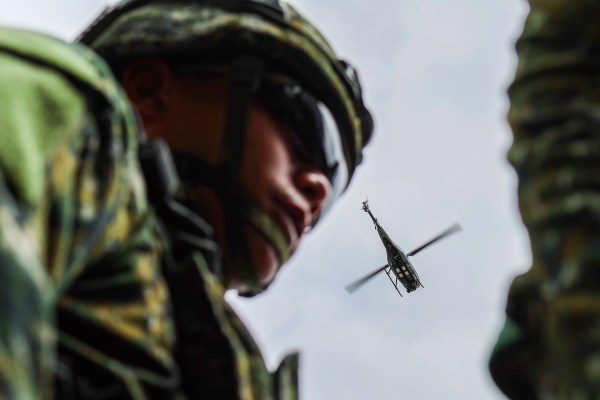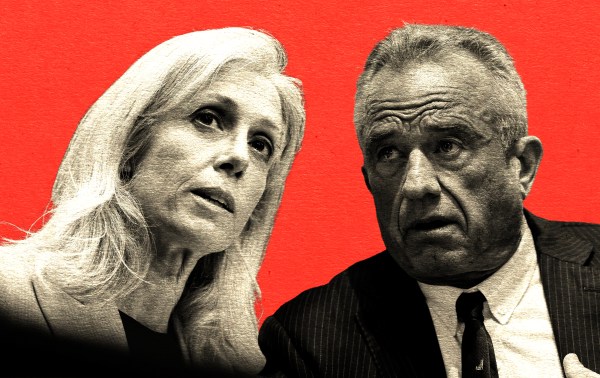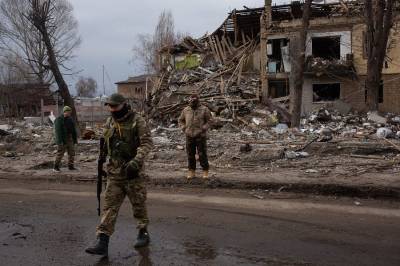One of the silver linings of the very large dark cloud of Vladimir Putin’s invasion of Ukraine is the clarity it provides. This is, broadly speaking a contest between good guys and bad guys.
A lot of people who fancy themselves foreign policy realists roll their eyes at talk about “good guys” versus “bad guys.” The world is made up of nation-states with interests and those states act rationally on their interests. Good and bad ain’t got nothing to do with it.
I’ve never bought this argument, on either analytical or moral terms.
Yes, nations have interests, but the way they define their interests is not always strictly rational. History is full of examples of nations committing vast resources to causes that are extra-rational. “The mistake of the ‘realists’ is not their interest in the struggle for power but their deliberate neglect of everything else, especially the non-scientific, contingent, very human feelings and beliefs that most powerfully move people,” the late, great Donald Kagan wrote in Honor Among Nations: Intangible Interests and Foreign Policy.
To claim that, say, North Korea’s foreign and domestic policy is simply an expression of its rational self-interest is to declare you don’t know anything about North Korea—or the decisions its rulers chose to make in turning that society into a xenophobic gulag.
Choices matter. And that’s where the moral failings of realism come in. Realists tend to conflate the interests of rulers with the interests of the ruled. It’s hard to find a sane analyst who argues that Putin invaded Ukraine solely in the name of Russia’s rational self-interest rather than his own notions of glory and historical retribution, and it’s even harder to find one who thinks the invasion is objectively in the interest of the Russian people.
Again, while it would have been in everyone’s interest—however you define it—for Putin not to have committed this monstrous crime, his choice makes it easy to call him and his enablers the bad guys. Deliberately targeting civilians, sanctioning mass executions and rape, not to mention the intentional wholesale erasure of cities is objectively evil. The Russian state tacitly admits this when it refuses to tell its own people what it is doing.
Indeed, the scope of Russia’s lies is so great that the liars are starting to say the quiet part out loud: that truth and truth-telling is an impermissible threat to the Russian regime.
Margarita Simonyan, the head of RT (formerly Russia Today), which once claimed to be a legitimate news organization, recently declared that, “No big nation can exist without control over information” and that Russia should follow the Soviet or contemporary Chinese model, which would deny people freedom in “the political life of their country, in the informational life of the country.” With media voices like Simonyan in charge, no wonder Putin allegedly polls well in Russia.
There’s equal clarity for the United States. I think the realist case for doing everything possible to assure a Russian defeat is obvious. It is Russian policy to undermine our interests and the interests of our allies around the world.
But there’s a deeper moral realism involved. In the 1990s, we pushed Ukraine to relinquish its nuclear weapons in exchange for security guarantees. In 2005, a bipartisan effort led by Sens. Dick Lugar and Barack Obama resulted in Ukraine destroying vast amounts of its conventional weapons, on the assumption that those security guarantees would be honored. In other words, we told them we’d have their back.
Putin said those guarantees—which Russia signed on to—were null and void because the Ukrainian Euromaidan protests in 2013 and 2014 ushered in a new Ukrainian state. Whether you buy that garbage is immaterial; Putin’s betrayal of his commitments doesn’t release us from ours. And it is in our interest to be seen as a nation that honors its commitments, both moral and legal.
None of this is to say we should send our own troops into Ukraine—not that we wouldn’t be morally justified. Igniting a direct war between two nuclear superpowers is a bad idea. Besides, Ukraine isn’t asking for that. It is asking for the modern equivalent of the arsenal of democracy, and we should give it to them, fast. Because Putin is poised to double down on his crimes in eastern Ukraine just to save face. It’s not in our interest that he succeed.







Please note that we at The Dispatch hold ourselves, our work, and our commenters to a higher standard than other places on the internet. We welcome comments that foster genuine debate or discussion—including comments critical of us or our work—but responses that include ad hominem attacks on fellow Dispatch members or are intended to stoke fear and anger may be moderated.
With your membership, you only have the ability to comment on The Morning Dispatch articles. Consider upgrading to join the conversation everywhere.